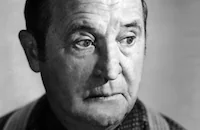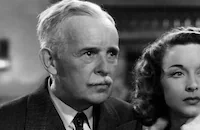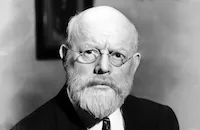Lady for a Night
Brief Synopsis
Cast & Crew
Leigh Jason
Joan Blondell
John Wayne
Philip Merivale
Blanche Yurka
Ray Middleton
Film Details
Technical Specs

Synopsis
In the late 1800s, Jenny Blake, the beautiful owner of the Memphis Belle , a riverboat casino, aspires to a life in high society. The upper classes of Memphis society look down on Jenny because of her occupation, however, even though the men of aristocratic families regularly visit her establishment. Jack Morgan, co-owner of the Memphis Belle and an influential political boss, is in love with Jenny but arranges for her to be crowned queen of the high society Mardi Gras carnival in order to teach her a lesson. Despite the humiliation she suffers when the partygoers are infuriated by her presence, Jenny is determined to break into society. Her opportunity comes in the form of Alan Alderson, the drunken, cynical scion of an old family that owns a once-grand plantation called "The Shadows." Despite enormous tax burdens that threaten the loss of "The Shadows," Alan gambles and loses heavily at Jenny's club. She offers to forgive his debts and pay off his taxes if he will marry her, thereby giving her a respectable name and position. Alan reluctantly agrees and they are married immediately. Jenny returns to the boat following the impromptu ceremony, and after telling the disappointed Jack of her marriage, allows the Memphis Belle to be consumed by an accidental fire. Alan's father Stephen and aunt Julia are horrifed by the marriage, although his mentally unstable aunt Katherine is thrilled by the thought of having a new friend. Alan tells his family that they must accept Jenny due to their financial position, but Julia is determined to get rid of her. Julia's efforts range from making insinuations about Jenny's relationship with Jack to trying to ruin a ball she is to host. Jack uses his influence to force Jenny's guests to attend the ball, despite Julia's attempt to get them to stay away. The final blow comes when Julia gives Jenny a blind carriage horse that almost causes Jenny's death when it runs wild. When Jenny orders Julia to leave "The Shadows," Julia retaliates by fixing a poisoned drink for her. Alan drinks the toddy instead, however, and Jenny is accused of murdering him. At the trial, Katherine, who knows that Julia deliberately poisoned the drink, is intimidated by her sister into lying to incriminate Jenny, and Jenny is convicted. Unable to bear the pressure, Katherine eventually reveals that Julia killed Alan, just as years earlier, jealousy caused her to kill Katherine's fiancé. Cleared of the crime, Jenny returns with Jack to his club, where she happily resumes her old life and agrees to marry him.

Director
Leigh Jason
Cast

Joan Blondell

John Wayne

Philip Merivale
Blanche Yurka
Ray Middleton
Edith Barrett

Leonid Kinskey
Hattie Noel

Montagu Love

Carmel Myers

Dorothy Burgess
Guy Usher
Ivan Miller
Patricia Knox
Lew Payton
Marilyn Hare
The Hall Johnson Choir
Margaret Armstrong
Betty Hill
Jac George

Pierre Watkin
Forbes Murray

Frank Orth

Roy Gordon
Ira Buck Woods
Kathryn Sheldon
Minerva Urecal

Howard Hickman
Eula Morgan
Dudley Dickerson
Paul White
Gladys Gale
Charles Miller
Charles Mcavoy
Dick Rush
Henry Thomas
Neely Edwards
Mickey Simpson
Charles Sherlock
Gaby Mclaughlin
Tito Valdez
Leigh Whipper
Hal Cooke
Lloyd Whitlock

Howard Mitchell
Dewey Robinson

Dolores Gray
Edith Evanson
Martin Turner
Corinne Valdez
Maxine Ardell
Janet Graves
Loretta Barnett
Valerie Hall
Bunny Bronson
Marion Huston
Margaret Bryson
Jean Leroy
Jeanette Dickson
Dorothy Schoemer
Frances Gladwin
Nancy Savoy

Gertrude Astor
Pearl Early
Jack Kenney
Crew
William G. Beymer
Norbert Brodine
David Buttolph
Albert J. Cohen
Isabel Dawn
Boyce Degaw
H. B. Farnie
Cy Feuer
Phil Ford
Garrett Fort
Dave Gould
John Victor Mackay
Sol Meyer
Ernest Nims
Walter Plunkett
Murray Seldeen
Jule Styne
Al Wilson

Film Details
Technical Specs

Quotes
Trivia
Notes
The working titles of this film were The Lady of New Orleans, Lady from New Orleans and Memphis Belle. According to a Hollywood Reporter news item, Mae Clarke was signed to a term contract by Republic in May 1941, and as her first assignment, was to have a "featured role" in the picture. She does not appear in the finished film, however. In early June 1941, Hollywood Reporter noted that Republic was "angling" for Miriam Hopkins and Judith Anderson to appear in the film in "top roles." The picture marked actress Carmel Myer's first screen appearance since 1934 and the motion picture debut of musical comedy star Dolores Gray (1924-2002).
According to the film's file in the MPAA/PCA Collection at the AMPAS Library, the PCA warned the studio that the script would not be approved if there was any suggestion that "Jenny" and "Jack" had a "sex affair," or if "Jenny" was guilty of arson rather than of allowing an accidental fire to burn. An April 18, 1940 letter from the PCA to Republic, concerning a April 15, 1940 script, indicates that "Stephen" and "Julia" were killed at the end of that version. In response to a May 31, 1941 script, the PCA ordered that "Julia" must die an accidental death at the end and not be shown to elude a murder conviction by committing suicide. "Julia's" fate in the released film remains unknown.

Miscellaneous Notes
Released in United States 1941
Released in United States 1941











